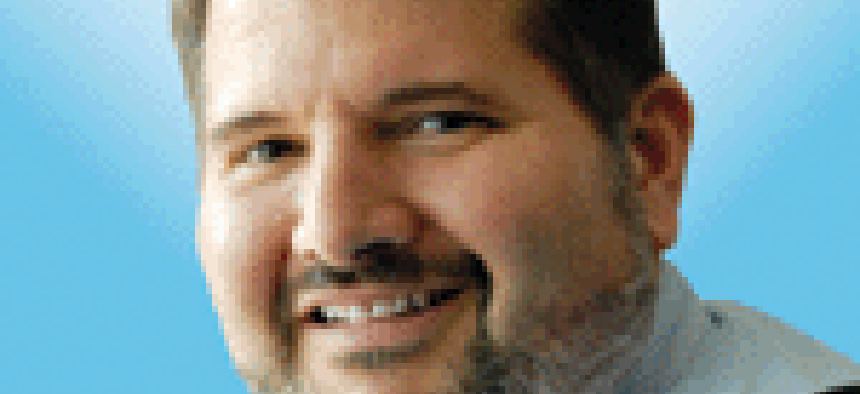SAIC founder dies at age 90

J. Robert Beyster, one of the pillars of the government contracting industry, died Monday at his home at the age of 90. He leaves a legacy built on a belief in employee ownership and entrepreneurship and a dedication to technological advancement.
One of the pioneers of the government contracting industry, J. Robert Beyster, died Monday morning at the age of 90 at his home in San Diego.
Beyster will forever be linked to Science Applications International Corp., the company he founded in 1969 and built into a $6.7 billion company. At the time of his retirement in 2004, it was the largest employee-owned science and technology company in the world.
It also was one of the companies that laid the foundation for the government contracting industry providing IT, science and engineering services to the federal government.

Robert Beyster, founder, SAIC
His legacy continues to be felt through the company he founded and his dedication to employee ownership, entrepreneurship and national service.
Beyster was a businessman, yes, but he also relished leading a company that took on tough problems of national import and finding solutions for them. He never tired of looking forward to the next technological breakthrough in a variety of scientific, engineering and technical fields.
One of his guiding principles was that the people who worked to build a company – the rank and file employees – should share in its success and prosperity. He lived what he preached and owned about 1 percent of the company’s shares for most of his tenure at the company.
But by the time he retired, the company he had spent 34 years building was well on its way to abandoning the employee-ownership model Beyster so strongly advocated. Saddled with financial liabilities due in part to the payouts owed to employees as they retired, the company leadership felt going public was the only alternative.
The decision to conduct an IPO in 2006 was a bitter one for Beyster to swallow and one that he partly blamed on himself and mistakes he made in the selection of directors for the company board and in succession planning.
He outlined his regrets and lessons learned in an updated version of his book the SAIC Solution, which was published earlier this year.
Beyster’s SAIC lives on today through two companies, Leidos and SAIC, which were formed when the original SAIC split into two companies in 2013, another decision that Beyster disagreed with.
Technically, SAIC spun out a company and changed its name to Leidos. The portion that was spun out kept the SAIC name.
Leidos CEO Roger Krone issued a statement on Beyster’s death recognizing his accomplishments and legacy.
“Over the past forty years his legacy has inspired the thousands of employees who followed his footsteps and influenced an industry that touches on all facets of American life,” Krone said.
Beyster was more than just the company he founded. He launched the Foundation for Enterprise Development in 1986 in part to promote employee-ownership. In 2004, the foundation started the Beyster Institute at the University of California-San Diego Rady School of Management to advanced employee ownership with technologists, entrepreneurs, executives and educators.
He was very active with education and health care groups, including his alma mater, the University of Michigan, to which he contributed significant financial support, including a $15 million gift that launched the J. Robert Beyster Computational Innovation Graduate Fellows Program.
He also loved sailing and involved SAIC in the America’s Cup competition as part of the technical team that supported Dennis Conner’s boat, the Stars & Stripes, and its victory over the Australians in 1987.
Before founding SAIC, he was an accomplished physicist having earned his bachelor’s, master’s and doctorate degrees from the University of Michigan. He enrolled in the university after serving in the Navy during World War II.
He met his wife, Betty, while working as a research physicist at the Los Alamos National Laboratory. They moved to San Diego in 1957 when he joined General Atomic.
He sold his General Atomic stock in 1969 to help fund the launch of SAIC. Other funds came from investments from early SAIC employees who bought stock in the company.
Throughout his tenure, he advocated a culture of entrepreneurship, a value that the current SAIC continues to claim.
“Dr. Beyster’s legacy and entrepreneurial spirit remain fundamental components of SAIC,” a spokeswoman said. “We are grateful for his vision and for laying the foundation of SAIC’s values.”
Beyster was inducted into the hall of fame of the Greater Washington Government Contractor Award program in recognition of his accomplishments and for helping lay the foundation for the modern government contracting market.
Beyster is survived by his wife Betty, a daughter Mary Ann Beyster of La Jolla, Calif.; two sons, Jim Beyster of San Diego, and Mark Beyster of Las Vegas; two grandchildren; one great-grandchild; and a sister, Virginia.
The family is planning a private memorial service to be held at Greenwod Memorial Park in San Diego. A public service will be announced in the new year.
The family is welcoming comments at his blog, beyster.com.
In lieu of flowers, donations may be made to the Salvation Army Door of Hope in San Diego, Achievement Rewards for College Scientists Foundation for scholarships or the Foundation for Enterprise Development to support employee ownership.
NEXT STORY: WT takes a holiday break


